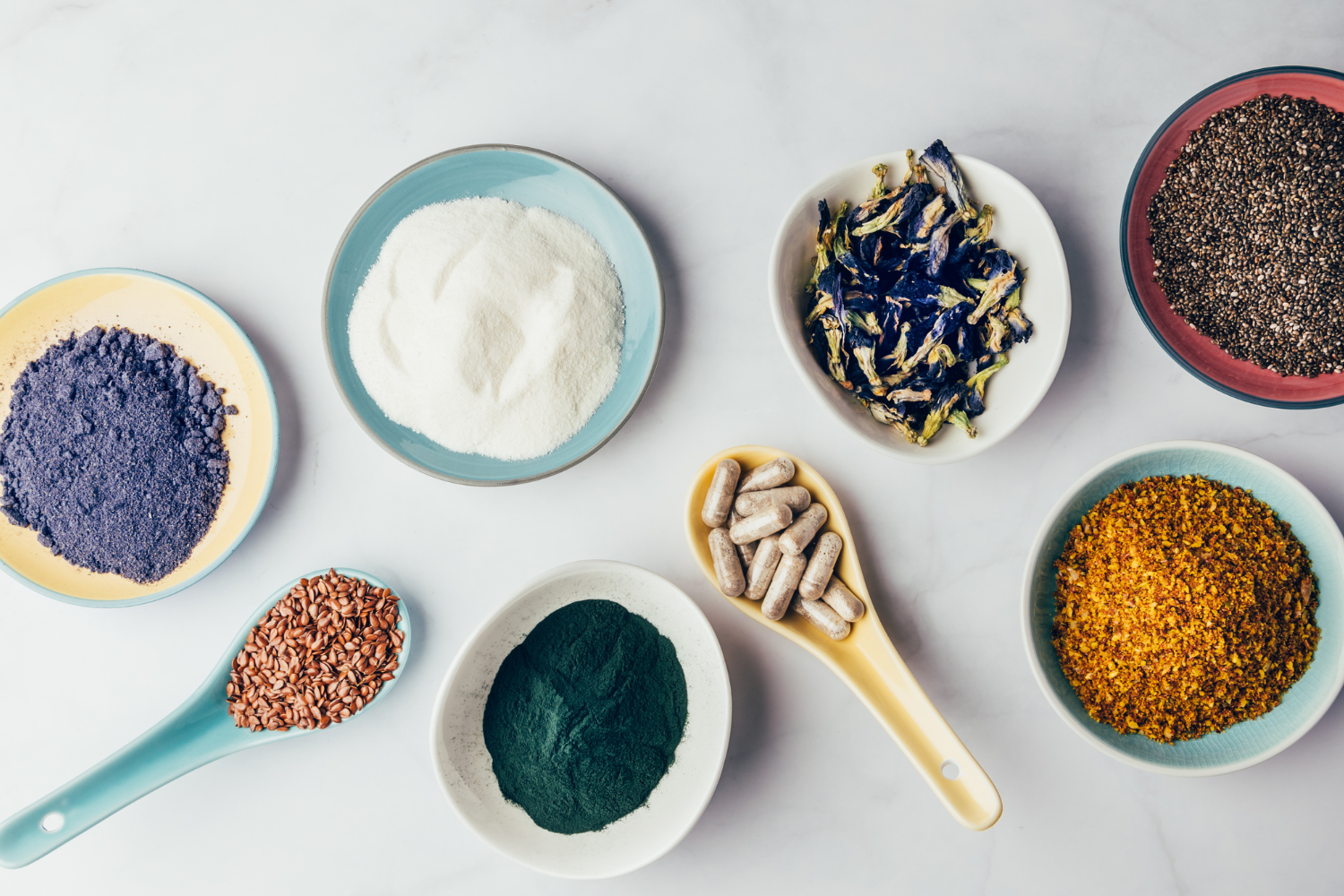With a growing consumer focus on mental well-being and quality sleep, sleep and relaxation supplements have quickly become a high-demand category in the health and wellness market. For brands, adding sleep aid supplements offers a strategic opportunity to diversify product lines, attract new customers, and address a pressing health need.
Whether for new brands or established names, introducing effective sleep formulas—featuring natural ingredients like melatonin, valerian root, and chamomile—can boost brand credibility, foster customer loyalty, and improve profitability by meeting the increasing demand for products that promote relaxation, healthy sleep patterns, and overall well-being.
Understanding Sleep and Relaxation Supplements for Your Product Line
Sleep and relaxation supplements are dietary supplements designed to support a good night’s sleep and promote relaxation. These products are intended to support relaxation and restful sleep, helping users with their bedtime routine. By easing stress and promoting restful sleep, sleep aid supplements help regulate the body’s sleep-wake cycle, supporting healthy sleep patterns and overall well-being.
Common Types of Sleep Products
Choosing the right format for your brand’s sleep supplements can make a big difference in reaching your target audience. Here are some popular formats:
- Capsules: Easy to take and often contain concentrated sleep formulas with ingredients like melatonin, valerian root, or magnesium to support sleep quality.
- Gummies: A tasty, convenient option, especially popular among those who prefer chewable formats with natural flavors.
- Powders: These can be mixed with water or a bedtime beverage, appealing to consumers looking for a customizable dose.
- Teas: Herbal teas with ingredients like chamomile and lemon balm extract promote relaxation and can become part of a soothing bedtime ritual.

Benefits of Offering Sleep and Relaxation Supplements as a Health Brand
Incorporating sleep supplements into your product lineup can help your brand meet a crucial wellness need while boosting customer loyalty and expanding revenue opportunities.
Meeting Consumer Demand for Natural Sleep Aids
With the increased focus on mental health, consumers are turning to natural sleep aids to support relaxation and improve sleep quality. According to recent industry reports, the global sleep supplement market is projected to grow as people seek non-habit-forming options to promote quality sleep without the side effects of some traditional sleep aids. This shift shows that brands offering natural, effective sleep aid supplements are well-positioned to meet this expanding demand.
Products with well-known, natural ingredients like melatonin, chamomile, and L-theanine build customer trust by providing safe, recognizable options for better sleep. When consumers see high-quality sleep products prioritizing safe, non-GMO, and gluten-free ingredients, they are more likely to view these brands as reliable sources for effective sleep support.
Expanding Product Range for a Diverse Customer Base
Sleep and relaxation supplements appeal to a broad range of people with varying needs. Busy professionals may need sleep aids to manage stress, while students might seek support for better sleep patterns during exam periods. Parents often look for non-habit-forming supplements to help them fall asleep faster and wake up refreshed, while wellness enthusiasts may prioritize natural ingredients and overall well-being.
Bundling sleep supplements with other popular products, like immune support or stress-relief supplements, can create a seamless wellness solution for customers. This cross-selling approach can increase retention as customers find comprehensive solutions within one brand, meeting their varying health needs in one place.

Enhancing Brand Value and Differentiation
High-quality sleep supplements can strengthen your brand’s positioning as a comprehensive wellness provider. A brand that offers carefully formulated sleep aids becomes a trusted source of solutions for healthy sleep patterns, stress management, and overall wellness, building a reputation in a competitive market.
Creating unique blends with organic or specialized ingredients, such as valerian root or lemon balm, can further set your brand apart. Prioritizing clean, non-GMO, and natural ingredients emphasizes your commitment to quality, giving you an edge by appealing to health-conscious consumers who value transparency and quality in their supplements.
Key Ingredients in Effective Sleep and Relaxation Supplements
The effectiveness of sleep and relaxation supplements largely depends on their ingredients. Key elements like melatonin, magnesium, and calming herbs can enhance sleep quality, reduce anxiety, and promote overall relaxation.
Melatonin
Melatonin, a hormone produced naturally in the brain, helps regulate the body’s sleep-wake cycle. As a popular, science-backed sleep aid, melatonin supplements appeal to consumers looking to fall asleep faster and support a healthy night’s sleep without the groggy feeling often associated with synthetic sleep aids. By aligning with the body’s natural rhythms, melatonin is used to support healthy sleep patterns and align with the body’s natural rhythms.
Formulation Tips
To create effective melatonin products, follow these best practices:
- Moderate Dosage: Start with lower doses, as 1-3 mg is often sufficient for quality sleep without drowsiness.
- Combine with Calming Ingredients: Blend with herbs like chamomile or lemon balm to enhance relaxation and avoid over-dosing.
- Time-Release Formulas: Consider time-release melatonin for consumers struggling to stay asleep through the night.
Magnesium
Magnesium is known to support muscle relaxation and nerve health, which may aid users in unwinding before bed. This mineral supports the body’s nervous system, helping reduce muscle tension and stress that may interfere with quality sleep. Magnesium is often sought after by those looking to promote relaxation and reduce anxiety naturally, especially before bedtime.
Powders and capsules are prevalent formats for magnesium supplements. Powders offer customizable dosing, making it easy for consumers to add magnesium to their evening routine, while capsules provide a convenient, precise dose that appeals to on-the-go users.
Valerian Root and Passionflower
Valerian root and passionflower are traditionally used for their calming properties and to support relaxation. These herbs are beneficial for consumers seeking to unwind without the heavy sedation that some sleep aids produce. Valerian and passionflower are ideal for sleep aid supplements focused on stress relief by supporting relaxation naturally.
For enhanced relaxation, consider combining valerian root and passionflower with other adaptogens like ashwagandha or mild sleep aids such as L-theanine. These blends provide a balanced, non-habit-forming solution for consumers looking to reduce anxiety and promote a restful night’s sleep.

L-Theanine
L-theanine, an amino acid commonly found in tea leaves, helps promote calmness without causing drowsiness, making it suitable for day and night supplements. By supporting relaxation without heavy sedation, L-theanine allows consumers to manage stress and maintain focus, making it a versatile ingredient in sleep and relaxation products.
It’s especially popular in tea-based supplements and capsules, which are appealing to consumers interested in a gentle, natural way to reduce stress. This amino acid works well with other calming ingredients, offering brands a unique selling point in sleep support and relaxation formulas.
CBD (Cannabidiol)
CBD has gained significant attention as a natural option for promoting relaxation and reducing stress. By interacting with the body’s endocannabinoid system, CBD is often sought out for its potential to promote relaxation and calm, though effects can vary by individual. The rising demand for CBD sleep products reflects growing consumer interest in plant-based relaxation options.
Verifying the legality of CBD in your target market is essential to ensure product safety and regulatory compliance. Sourcing high-quality, third-party-tested CBD assures consumers of your brand’s commitment to quality, supporting trust and effectiveness in your sleep supplement product line.
Steps for Health Brands to Develop and Launch Sleep Supplements
Conduct Market Research and Define Your Target Audience
Identifying consumer needs is crucial when developing a sleep supplement. Focusing on specific demographics can help brands better align their products with targeted customer needs. For example, busy professionals may look for sleep aids to improve sleep quality and reduce stress. At the same time, athletes might need muscle relaxation and recovery support to help with restful sleep. Understanding these needs allows brands to design products that match lifestyle demands.
In addition to consumer needs, competitor analysis is essential. Researching what other brands offer can highlight gaps in the market, such as the need for organic, vegan, or non-GMO sleep supplements. By identifying these gaps, brands can stand out and create unique offerings that attract health-conscious customers seeking quality sleep solutions.
Select High-Quality Ingredients and Formulate Thoughtfully
Sourcing ingredients from reputable suppliers is vital to ensuring the safety and efficacy of your sleep supplements. Choosing third-party-tested ingredients guarantees purity and potency, which are essential for building consumer trust and effectively promoting health benefits. High-quality ingredients, like valerian root, melatonin, and magnesium, help provide the foundation for a trusted sleep aid that supports relaxation and healthy sleep patterns.
Formulation Tips
To create compelling and appealing sleep formulas, consider these strategies:
- Combine Complementary Ingredients: Mix calming herbs like chamomile with melatonin to support relaxation and a good night’s sleep.
- Optimize Dosages: Use effective, science-backed doses of each ingredient to avoid over-dosing and provide balanced support.
- Focus on Non-Habit-Forming Formulas: Choose non-habit-forming, natural ingredients to meet the needs of consumers seeking safer, long-term sleep aids.

Focus on Packaging and Labeling Compliance
Sleep supplement packaging should include accurate labeling without unverified health claims to meet FDA guidelines. Clear labeling helps consumers understand what the product offers, with information on dosage, intended use, and any necessary precautions. For instance, labels should describe that a supplement is intended to support relaxation and sleep quality without making specific medical claims.
Eye-Catching Packaging
Packaging design should appeal to wellness-focused consumers while conveying relaxation. Here are some tips:
- Use Soothing Colors: Calming colors like blue or green suggest relaxation and sleep support.
- Highlight Key Benefits: Clear messaging about being non-GMO, gluten-free, or non-habit-forming can attract health-conscious buyers.
- Ensure Readability: Use clean fonts and layouts that make it easy for consumers to find essential information about the supplement.
Test, Certify, and Ensure Product Safety
Third-party testing is crucial to confirm product purity, potency, and safety. Having an independent lab verify ingredients builds consumer trust, ensuring that customers feel confident in the quality and safety of your sleep supplements. This is particularly important in the health and wellness space, where trust plays a big role in purchasing decisions.
Certifications such as Good Manufacturing Practices (GMP) or NSF certification further emphasize product quality and manufacturing standards. These certifications signal that your products meet stringent safety and quality requirements, providing a competitive advantage and aligning your brand with the highest standards in supplement manufacturing.

Marketing Strategies for Launching Sleep and Relaxation Supplements
Highlight Benefits that Resonate with Your Audience
To effectively reach wellness-minded consumers, focus on customer-centric messaging that speaks directly to their needs. Highlight benefits like “supports restful sleep” and “reduces stress naturally” to attract those seeking relaxation and healthy sleep patterns. Phrasing like this speaks to their desire for safe, non-habit-forming solutions that promote overall well-being.
Educating customers about key ingredients is also a powerful way to connect with them. You can explain how popular ingredients like melatonin and L-theanine support a calm mind and quality sleep through content marketing, such as blog posts or social media. By sharing the science and benefits behind each ingredient, you can build trust and help customers feel confident choosing your sleep supplements.
Utilize Influencer Partnerships and Wellness Experts
Partnering with influencers in the wellness space can help expand your reach and build credibility. Sleep and wellness influencers have dedicated audiences who trust their recommendations, making them ideal partners for promoting your products. By working with influencers, you can increase visibility and reach consumers interested in improving their sleep and reducing stress.
Incorporating testimonials and reviews is another powerful way to boost credibility. Positive feedback from real users adds social proof and gives potential customers a sense of how well your products work. Displaying these reviews on your website or sharing them on social media provides reassurance to new customers and supports your brand’s authenticity.

Offer Samples, Trials, or Bundles
Offering product samples or bundle options can encourage customers to try your sleep supplements before committing to a full-sized product. Providing small trial sizes or bundling sleep products with other wellness supplements can help introduce new customers to your brand. This approach gives customers an easy, low-risk way to experience the benefits of your products firsthand.
Consider implementing subscription and loyalty programs to foster repeat purchases. Offering discounts or rewards for loyal customers can increase customer retention and drive long-term loyalty. Subscriptions make it easy for consumers to receive their favorite products regularly, while loyalty programs incentivize them to continue purchasing and engaging with your brand.
Frequently Asked Questions
What certifications should I get for sleep supplements?
Obtain GMP certification and third-party testing, and consider organic or vegan certifications to attract health-conscious customers.
How long does it take to develop and launch a sleep supplement?
Development timelines can vary, often taking several months depending on formulation, testing, and regulatory requirements.
Can I sell sleep supplements internationally?
Regulations vary by country, so research compliance requirements in each target market to ensure legality.
How do I decide on the right dosage for ingredients?
Popular ingredients include melatonin, magnesium, and herbal extracts like valerian root, which support restful sleep and relaxation.
What are the most popular formats for sleep supplements?
Common formats include capsules, gummies, powders, and teas, allowing brands to cater to diverse consumer preferences for sleep support products.
Build a Successful Sleep and Relaxation Supplement Line
Sleep and relaxation supplements offer health brands a valuable opportunity to tap into a high-demand market while enhancing customer wellness. Adding well-formulated sleep aids to your product line can attract a broad audience and support brand credibility.
Begin by taking steps in formulation, testing, and compliant labeling to ensure a high-quality product. Consider reaching out to reputable ingredient suppliers, partnering with certified labs, or consulting a wellness branding expert to kickstart the development of a practical and appealing sleep supplement line.
References
- Centers for Disease Control and Prevention. (2024). About Sleep. Retrieved from https://www.cdc.gov/sleep/about/index.html
- National Center for Complementary and Integrative Health. (n.d.). Melatonin: What you need to know. Retrieved from https://www.nccih.nih.gov/health/melatonin-what-you-need-to-know
- National Institutes of Health. (2013). Valerian – Health Professional Fact Sheet. Retrieved from https://ods.od.nih.gov/factsheets/Valerian-HealthProfessional/
- Office of Dietary Supplements. (2022). Magnesium – Health Professional Fact Sheet. Retrieved from https://ods.od.nih.gov/factsheets/Magnesium-HealthProfessional/
- U.S. Food and Drug Administration. (2024). Dietary supplements. Retrieved from https://www.fda.gov/food/dietary-supplements
- U.S. Food and Drug Administration. (2024). FDA Regulation of Cannabis and Cannabis-Derived Products, Including Cannabidiol (CBD). Retrieved from https://www.fda.gov/news-events/public-health-focus/fda-regulation-cannabis-and-cannabis-derived-products-including-cannabidiol-cbd



